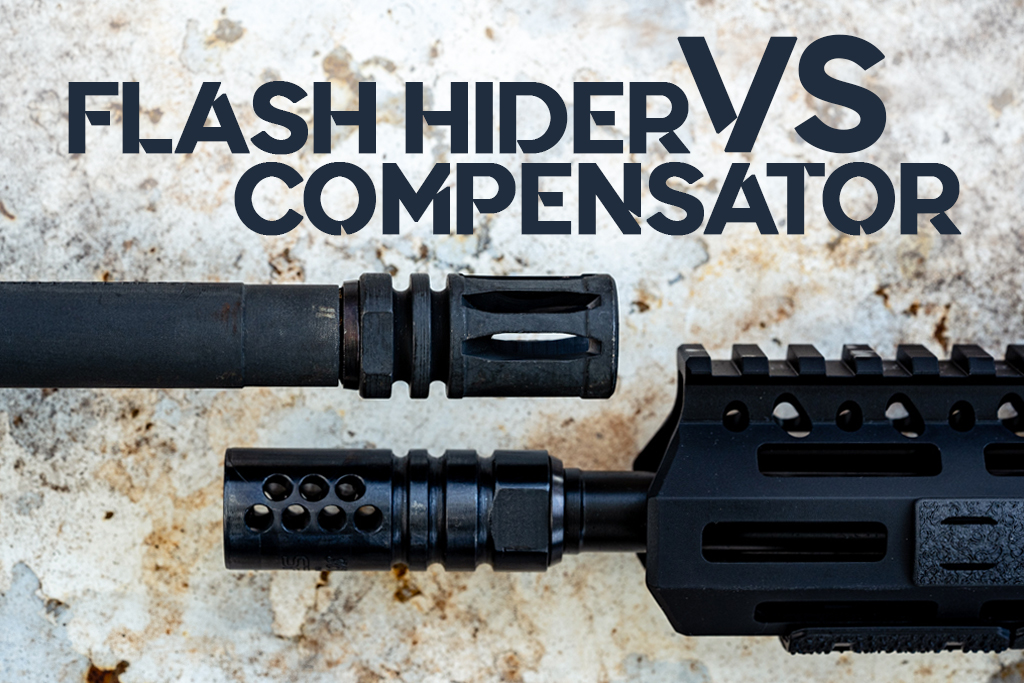So here we are, diving straight into the heart of the gun world where every detail matters and every upgrade counts. If you're reading this, chances are you're scratching your head trying to figure out the difference between a compensator vs flash suppressor. Don’t sweat it, amigo. You're in the right place. Today, we're breaking down these two crucial firearm accessories in a way that even your neighbor's cat could understand. Whether you're a seasoned shooter or just dipping your toes into the world of firearms, understanding the nuances between these attachments is essential. Buckle up, because we're about to get nerdy!
Now, before we dive headfirst into the nitty-gritty, let's lay some groundwork. Both compensators and flash suppressors are muzzle devices designed to enhance the performance of your firearm. But here's the kicker—they serve different purposes. A compensator helps reduce recoil, while a flash suppressor minimizes the bright muzzle flash that can give away your position in low-light situations. Get it? Got it? Good. Let's keep moving.
Before we get too deep into the specifics, let’s talk real talk for a sec. Choosing the right muzzle device isn't just about aesthetics or what looks cool on your rifle. It's about functionality, performance, and how it aligns with your shooting needs. So whether you're a tactical enthusiast, a competitive shooter, or just someone who wants to upgrade their firearm setup, we’ve got you covered. Let's dig in!
Read also:Embarc Fresno Your Ultimate Guide To Unveiling The Hidden Gem
What is a Compensator?
A compensator, often referred to as a "comp," is like the personal trainer for your rifle. Its main job? To keep that muzzle from jumping around when you pull the trigger. By redirecting propellant gases, a compensator significantly reduces recoil and muzzle rise. This means you can get back on target faster and more accurately. Who doesn’t want that, right? Let's break it down further:
- Recoil Reduction: Compensators are engineered to counteract the force that pushes your rifle upward during firing.
- Improved Accuracy: With less muzzle movement, you can maintain better control over your firearm, leading to more precise shots.
- Enhanced Follow-Up Shots: Whether you're shooting at a range or in a tactical situation, quicker follow-up shots can make all the difference.
Now, here's an interesting tidbit—compensators are more commonly used in rifles with larger calibers where recoil is a major factor. Think about it like this: if you're dealing with a beast of a firearm, you'll want something that can tame the beast.
What is a Flash Suppressor?
A flash suppressor, on the other hand, is all about stealth and subtlety. This nifty little device reduces the bright muzzle flash that occurs when unburned powder exits the barrel. Why does this matter? Well, for starters, a bright flash can temporarily blind you in low-light conditions, making it harder to aim or even see your surroundings. Plus, if you're in a tactical scenario, that flash can give away your position faster than you can say "tactical."
Here’s how it works: the flash suppressor disperses the gases and unburned powder in a way that minimizes the visible flash. Simple, yet effective. Let’s check out some key benefits:
- Reduced Flash: The obvious one—less flash means better visibility for you and less chance of detection.
- Improved Night Vision: No more getting blinded by your own firearm when shooting in the dark.
- Enhanced Tactical Advantage: In situations where stealth is crucial, a flash suppressor can be a game-changer.
And here’s the kicker—flash suppressors are often preferred in tactical rifles or any firearm used in low-light environments. So if you're planning on doing some night shooting, this is definitely something to consider.
Key Differences Between Compensator vs Flash Suppressor
Alright, now that we know what each device does, let's compare them side by side. Here's a quick rundown of the key differences:
Read also:Honda Of Tomball Your Ultimate Guide To Exceptional Service And Deals
- Purpose: Compensators focus on reducing recoil and muzzle rise, while flash suppressors aim to minimize muzzle flash.
- Usage: Compensators are more effective for improving accuracy and follow-up shots, whereas flash suppressors are ideal for enhancing visibility and stealth.
- Environment: Compensators work well in most shooting scenarios, but flash suppressors shine (pun intended) in low-light or tactical situations.
So, which one should you choose? Well, that depends on your specific needs and shooting environment. If you're dealing with heavy recoil, go for the compensator. If you're shooting in the dark, the flash suppressor is your best bet. But hey, you can always have both, right?
When Should You Use a Compensator?
Let’s talk about situations where a compensator is the way to go. If you're someone who prioritizes accuracy and control, especially in high-recoil firearms, a compensator is your new best friend. Here are some scenarios where it excels:
- Competition Shooting: Whether you're into 3-gun matches or long-range precision shooting, a compensator can help you maintain stability and accuracy.
- Recreational Shooting: If you're just out there having fun at the range, a compensator can make your experience smoother and more enjoyable.
- Tactical Training: For those practicing tactical scenarios, a compensator can help you stay on target during rapid fire.
And let’s not forget, compensators are particularly useful for larger calibers where recoil can be a real beast to handle. So if you're rocking a big-bore rifle, a compensator might just be the upgrade you need.
Popular Compensator Models
Now that we’ve established when to use a compensator, let’s take a look at some popular models:
- Brake compensators: These bad boys combine the benefits of a muzzle brake and a compensator for maximum recoil reduction.
- Standard compensators: Your run-of-the-mill compensators that get the job done without any fancy bells and whistles.
- Adjustable compensators: These allow you to tweak the settings based on your shooting needs, offering more customization.
No matter which model you choose, make sure it’s compatible with your firearm and meets your specific requirements. Remember, the right tool for the right job!
When Should You Use a Flash Suppressor?
On the flip side, flash suppressors are perfect for situations where stealth and visibility are key. Here’s when you should consider using one:
- Night Shooting: If you're planning on shooting in low-light conditions, a flash suppressor can save your eyes (and your cover).
- Tactical Operations: In tactical scenarios, minimizing your muzzle flash can mean the difference between success and failure.
- Hunting: For those who hunt in early morning or late evening, a flash suppressor can help you stay undetected by your prey.
And here’s something cool—flash suppressors are often used in conjunction with night vision equipment. By reducing the flash, you can ensure that your night vision remains unobstructed, giving you a clear view of your surroundings.
Popular Flash Suppressor Models
Now that we’ve covered the scenarios, let’s talk about some popular flash suppressor models:
- A2 Flash Hider: A classic choice for AR-15 platforms, known for its reliability and effectiveness.
- K-Flash: A more modern option that offers improved flash reduction and better gas dispersion.
- Birdcage Flash Hider: A popular choice for its distinctive look and solid performance.
As with compensators, make sure the flash suppressor you choose fits your firearm and meets your specific needs. After all, the right muzzle device can make all the difference in your shooting experience.
Can You Use Both a Compensator and Flash Suppressor?
Here’s the million-dollar question: can you use both a compensator and a flash suppressor on the same firearm? The short answer is yes, but there are a few things to consider. Using both devices can enhance your firearm's performance by addressing both recoil and flash issues. However, there are some trade-offs:
- Weight: Adding both devices can increase the overall weight of your firearm, potentially affecting its balance.
- Length: Having both devices can make your rifle longer, which might be a downside in certain situations.
- Complexity: More parts mean more potential points of failure, so make sure everything is properly installed and maintained.
That being said, if you’re willing to deal with the trade-offs, using both devices can give you the best of both worlds. Just make sure to test your setup thoroughly to ensure it performs as expected.
Factors to Consider When Choosing Between Compensator vs Flash Suppressor
Alright, let’s wrap up by discussing some key factors to consider when choosing between a compensator and a flash suppressor:
- Your Shooting Environment: Are you shooting in daylight, low-light, or both? This will dictate which device is more suitable for your needs.
- Your Firearm: Consider the type of firearm you’re using and its specific requirements. Some firearms may perform better with one device over the other.
- Your Shooting Goals: Are you focused on accuracy, stealth, or both? Your shooting goals will help guide your decision.
At the end of the day, the right choice depends on your unique situation and preferences. Take the time to evaluate your needs and test out different options to find the perfect fit.
Conclusion
So there you have it, folks—the lowdown on compensator vs flash suppressor. Whether you choose a compensator for its recoil-taming abilities or a flash suppressor for its stealth-enhancing powers, both devices offer significant benefits to your shooting experience. And hey, if you’re feeling adventurous, you can always rock both and see how it goes.
Before we part ways, let’s recap the key points:
- Compensators reduce recoil and improve accuracy.
- Flash suppressors minimize muzzle flash and enhance visibility.
- Your choice depends on your shooting environment, firearm, and goals.
Now, here’s where you come in. Did we miss anything? Have you tried both devices and have a favorite? Let us know in the comments below. And if you found this article helpful, don’t forget to share it with your shooting buddies. Until next time, stay sharp and keep shooting!
References
For more information on compensators and flash suppressors, check out these trusted sources:
Table of Contents
- What is a Compensator?
- What is a Flash Suppressor?
- Key Differences Between Compensator vs Flash Suppressor
- When Should You Use a Compensator?
- When Should You Use a Flash Suppressor?
- Can You Use Both a Compensator and Flash Suppressor?
- Factors to Consider When Choosing Between Compensator vs Flash Suppressor
- Conclusion
- References


